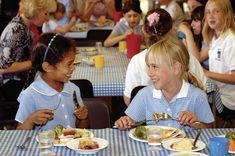
New research from Which? has found that the price of school meals is rising in two thirds of schools across the country this coming term.
Along with low rates of take-up, Which? is concerned that this could undo recent improvements in children’s access to healthier meals that help them do better at school.
While a majority of parents will see the cost of school meals rise below the rate of inflation this September, others will have to pay up to 17 per cent more than this time last year.
School meal prices have risen on average by around 2.5 per cent on last year, but some local authorities have increased prices by far more.
For primary school meals, Doncaster Metropolitan Borough Council has increased prices by 17 per cent (to £2 and Lewisham Borough Council by 14 per cent to £1.60.
The local authority with the biggest increase was Bolton Metropolitan Borough Council with 25 per cent although its prices still remain the lowest in the country at £1.25.
School meals managed by Poole Borough Council are the most expensive in the country at on average £2.50 in September 2011.
Analysts estimate that 55 per cent of students need to take school meals to keep costs down. However, the Which? research reveals that just 45 per cent of students in England take school meals. In some areas, including Wokingham District Council and West Sussex County Council, it is as low as 25 per cent.
The Which? study found that parents would rather give their children packed lunches as they believe them to be cheaper, and their children do not like the food on offer at schools.
This is compounded by the fact that the School Dinner Grant, which was set up to subsidise school meals, is no longer ring-fenced, meaning that since April 2011 local authorities can use the fund to top up other areas of need.
Which? believes these findings are an early warning sign that schools and local authorities need to do more to increase take-up to avoid bigger price hikes for families in the future, or potentially a loss of existing high-quality meals.
Richard Lloyd, executive director of Which?, said: “At a time when many people tell Which? their number one concern is rising food prices, it will come as an unwelcome surprise to hard-pressed families to see that some local authorities are increasing their prices by as much as 17 per cent - well above inflation. “School meals in most areas are still a relatively low-cost and low-hassle way to provide a decent lunch for your children. But if schools cannot find ways to protect the extra funding that has gone to school meals and increase the number of children taking them up, there'’s a real risk of even more price hikes or a drop in standards, undoing the progress that has been made over the past five years.”



